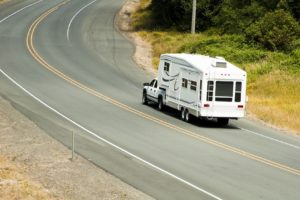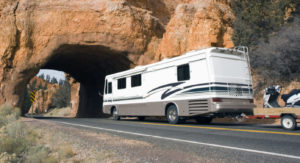Should I buy a trailer or motorhome?
If you’re thinking about buying an RV, the first major decision is whether you’re getting a travel trailer or a motorhome. So which one is best? There’s no right answer – it really depends on your needs and individual situation. In this article, we’ll review what you should consider as well as the pros, cons, and insurance factor of both trailers and motorhomes.
Things to Consider When Buying an RV
Here are some general factors to consider when buying an RV:
- Budget
- How you’ll use it
- Size
- Number of people that need to sleep in it
- Weather you’ll be camping in
- Features you want
- Tow vehicle
- Your preferred style of travel or camping
This will help you determine what you want and which RVs will work for you.
Trailers
There are many types of trailers, including:
- Tent or Popup Trailers – A collapsible trailer with a solid base and canvas sides.
- Travel Trailer – A hard-sided hitch towable trailer, comes in a variety of shapes and sizes.
- Hybrid Trailers – A mix between a tent trailer and travel trailer. It has hard sides with some soft side expansions.
- Truck Camper – A trailer that sits on top of the truck bed (not towed).
- Fifth Wheel – A large hard-sided trailer pulled by a special hitch in the truck bed. Fifth wheels are the luxury vehicles of the trailer category.
- Toy Hauler – Also known as a sport utility trailer, this is a travel trailer with a specially built area to store your toys like ATVs. They also generally have ramps to make loading easier.
Trailers come in every feasible size and shape, but they all share one main characteristic: they are towable. This means you need to consider your tow vehicle.
How much can my vehicle tow?
It’s important to consult your vehicle’s owner manual to find out how much your vehicle can tow. Keep in mind that the vehicle’s maximum towing capacity includes the trailer, passengers, hitch and cargo weight (all of your stuff including liquid in any of the tanks). You should never exceed your vehicle’s maximum towing capacity – this can damage your vehicle and contribute to an accident.
You’ll be able to find out an RV’s dry weight (the weight of the RV with nothing in it) on a sticker on the RV or by asking the dealer. You can find out the gross vehicle rate by adding the RV’s dry weight with the weight of the hitch, passengers, and cargo. You may be able to weigh your vehicle at a weigh station.
If you’re thinking of buying a fifth wheel, you should also check your tow vehicle’s payload capacity. This is the maximum amount of wight that can be carried in the bed of the truck.
Remember, someone selling an RV may assure you that your vehicle is fine to tow the trailer even if it’s not. It’s important that you know your vehicle’s capabilities and have a rough estimate of the weight that will be added to the dry trailer weight.
Pros of Buying a Trailer
- Generally cheaper than motorhomes
- You can leave it at the campsite
- The many different types and sizes means there’s something for everyone
- They offer a variety of features
- Very affordable insurance
- Less maintenance than a motorhome
Cons of Buying a Trailer
- Your tow capacity may limit your options
- Hitching up can be difficult
- You’ll need to check your hitch when you tow
- Trailers can be difficult to reverse
- Some trailers are very expensive!
- Varying levels of construction quality and features
- Soft sided trailers need to be dried if they get wet
- Soft sided trailers aren’t bear proof
Trailer Insurance
Trailer insurance starts at $200 per year. Your rates may be higher depending on your coverage, policy limits, deductible, value of your RV, and other factors.
While you may have the option of adding your trailer onto your home insurance policy, we recommend purchasing a separate trailer insurance policy for the following reasons:
- You may qualify for replacement cost coverage (not normally available with home policies)
- Cover your contents and outbuildings (often no or limited coverage with home policies)
- Get emergency vacation expenses if you have a covered claim while you’re on the road
- Get basic roadside assistance included
- You can get premises liability for your trailer (essential if you’re parked)
- No limits on how many days you can use your trailer
- We cover travel to the US for up to 6 months
Should I buy a trailer?
A trailer is a great option if you:
- Have a capable tow vehicle
- Are on a limited budget
- Want features that the trailer has
- Don’t want to worry about maintaining another vehicle
A trailer can work in almost any situation, whether you’re a family looking to camp over the summer or a couple looking to do some extended travelling.
Motorhomes
There are three main types of motorhomes:
- Class A – The largest and often most luxurious motorhomes, their shape resembling that of a bus.
- Class B – The smallest motorhomes also known as camper vans. These are generally built on a van chassis and vary in features.
- Class C – These medium-sized motorhomes are often placed on a truck chassis and offer similar amenities to a class A on a smaller scale.
All three classes of motorhomes can come with a gas or diesel engine. Depending on the motorhome, you may want to have a vehicle to tow along behind for easier movement once you’ve reached your destination.
Pros of Motorhomes
- No worrying about towing (unless you want to tow a second vehicle)
- Great for doing lots of travelling
- A good choice if you’re living in your RV full-time
- Different sizes and types means there’s something for everyone
- Tend to be quite comfortable and even luxurious
Cons of Motorhomes
- Generally, they’re expensive
- Unless you bring a vehicle, you’ve got to use your motorhome whenever you leave your campsite
- Higher maintenance costs
- Big motorhomes may not fit everywhere
Insurance for Motorhomes
Motorhome insurance policies usually start at $500 per year. Your rates will depend on how you use your motorhome; it’s year, make and model; it’s market value and it’s value new (MRSP); your driving record; your insurance history; and other factors.
Insuring a motorhome is different than a trailer because it is a drivable vehicle – you must have third party liability and accident benefits coverage. While you may be able to purchase a regular auto policy for a motorhome, we encourage you to get RV insurance for the following reasons:
- It can cover physical damage to your motorhome, its contents and outbuildings
- It’s quite affordable
- You’re covered if you travel to the US (for up to 6 months a year)
- You can get emergency vacation expenses if you have a covered claim while you’re travelling
Should I buy a motorhome?
If you have the budget, a motorhome is a great option for those who want to travel in style, don’t want a big tow vehicle, and are looking for a specific lifestyle (like van dwellers or snowbirding).
Trailer versus Motorhome
In the end, it really depends on your individual circumstances as to which is better for you. We recommend checking out an RV show or visiting a few dealerships so you can get a feel for which will work best. You can also try renting a few for shorter trips to be sure about your decision.
Either way, contact us when you’re ready to insure your new RV!


